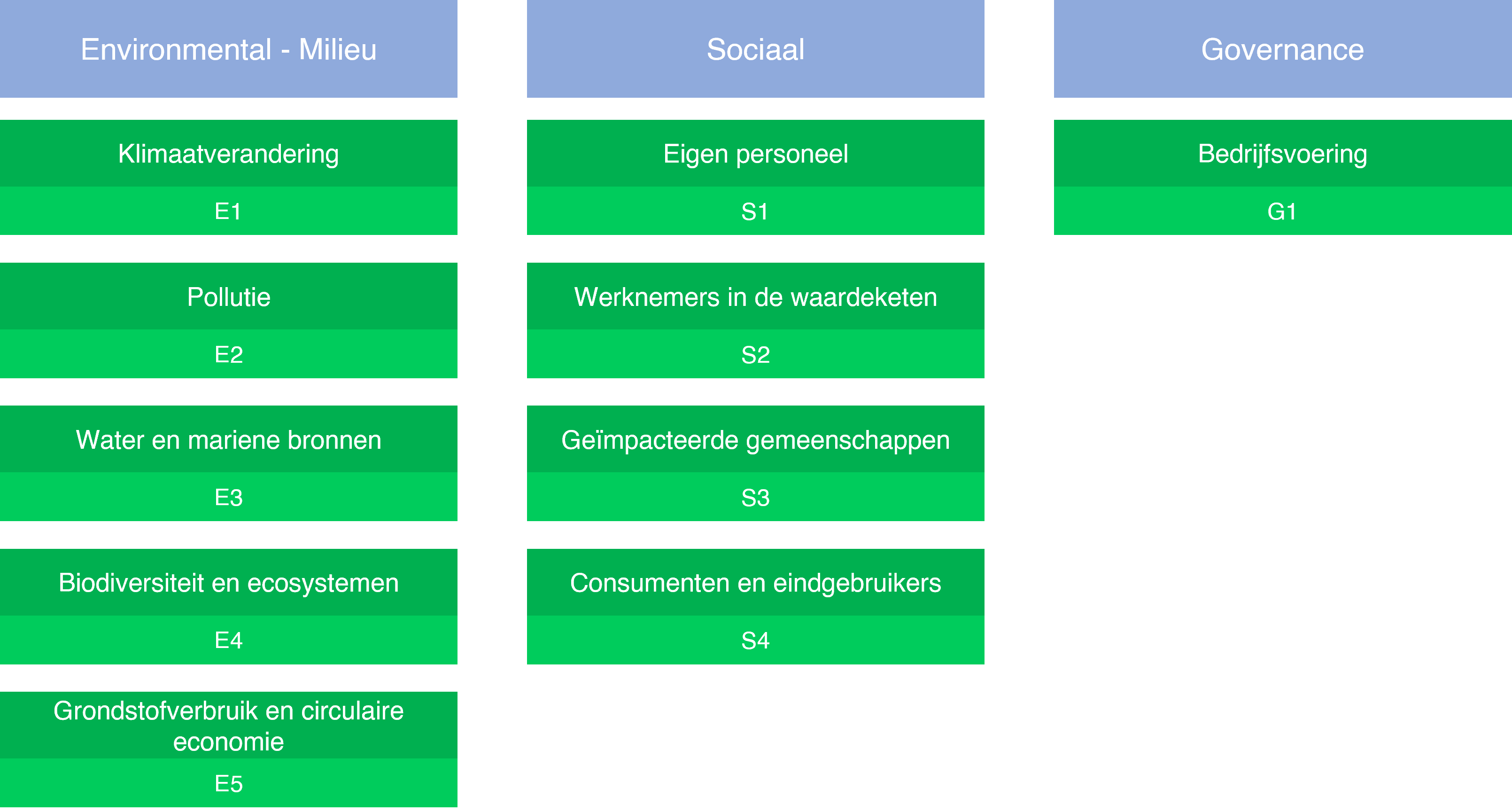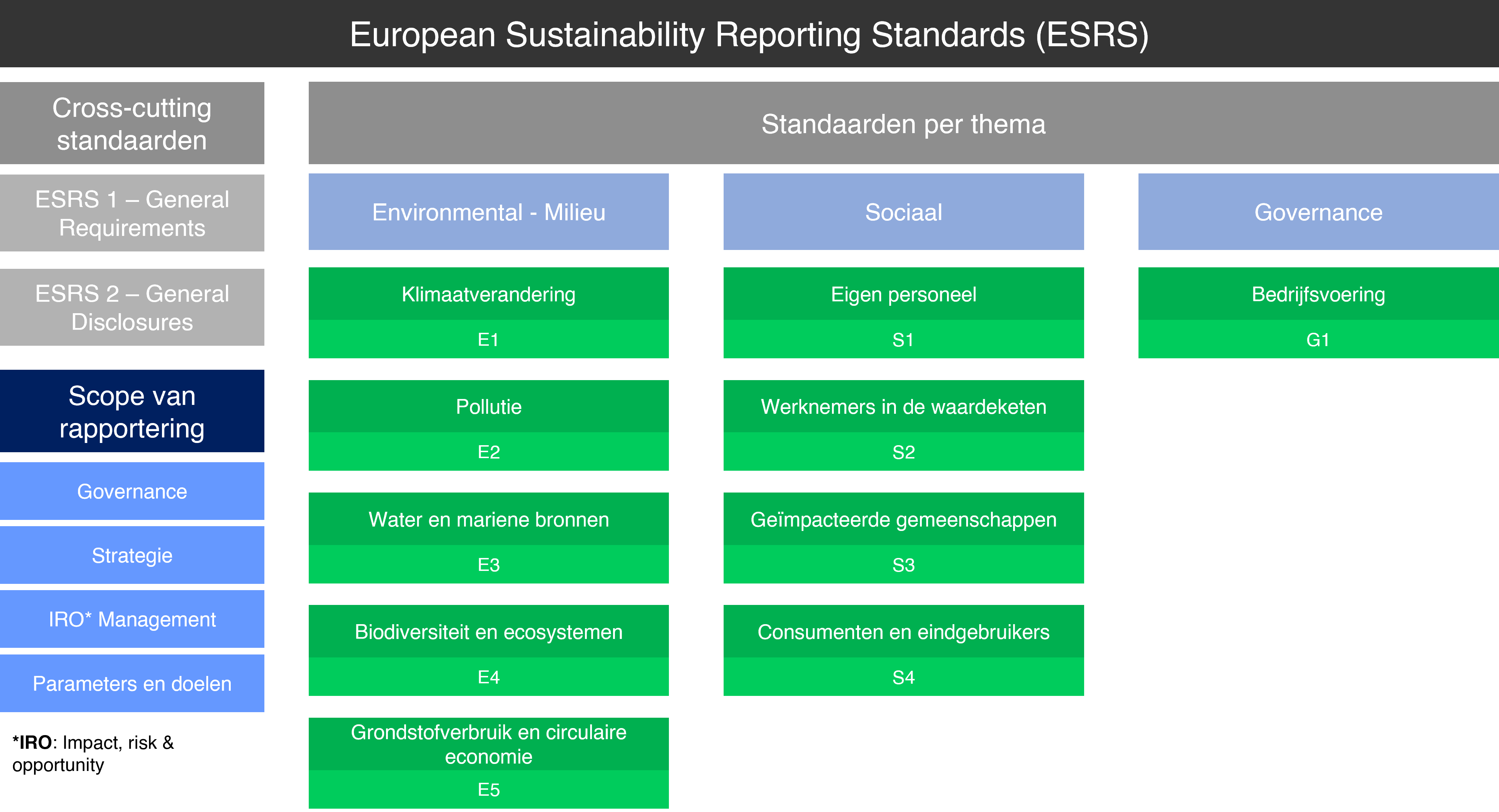As an entrepreneur, you may have heard terms such as ESG, CSRD and ESRS thrown around in various circles recently. This font soup of different abbreviations all relate to the upcoming sustainability reporting that will become mandatory for any company localized in Europe that meets specific criteria.
It is estimated that about 50,000 European companies will fall under the scope of the new European Directive (CSRD) and will consequently have to prepare a sustainability report. This is a substantial increase versus the approximately 15,000 European companies already reporting under the old Directive (NFRD).
It is clear that sustainability in all its aspects will play an increasingly important role in the economy in the near future and this will affect existing trading relationships. Every company, large or small, will have to do its part by collecting and questioning the necessary data, reporting on it or not, and setting targets.
Is sustainability reporting mandatory for my company?
Large companies (to be viewed at the consolidation level) will be required to publish a sustainability report in addition to their financial reporting starting in 2026. The first report to provide insight into the various sustainability pillars will cover activities that took place in 2025.
The European Commission defines large companies as any company that exceeds at least two of the following three criteria:
- > EUR 50 million in sales
- > EUR 25 million balance sheet total
- > 250 employees
These figures were last updated on 19/04/2024.
This reporting requirement stems from European legislation and will also be further expanded starting in 2027. Given the multitude of information that needs to be collected and assessed, many are already starting to map out the necessary issues.
Why does ESG still matter to me, even if I am not required to report?
Despite the fact that sustainability reporting is only mandatory for large companies or listed SMEs, companies of all sizes will indirectly face sustainability reporting in the short term.
As a supplier or customer of a company that needs to report, you may also need to answer certain questions or provide specific data to clarify your role in the value chain.
Some real-life examples to make possible questions about this comprehensible:
- An industrial laundry is responsible for washing bed linen for a major hotel chain. It asks what the average water consumption is for a package of linen and what steps will be taken over the next five years to reduce this consumption;
- A cardboard packaging product for the food industry is questioned about the percentage of recycled paper or cardboard used in the process and the destination of any residual streams;
- A manufacturer of wooden children's toys uses an Asian subcontractor to make various products. Information should be provided in which countries/regions the products are produced and what controls have been put in place to verify that workers are employed in appropriate conditions;
- A farmer is questioned about the use of certain pesticides when growing certain crops.
What can Titeca Pro Accountants & Experts do for you?
For all businesses
- If you as a non-company receive a question about this from your customer or supplier, we can create a framework for you as to why you are receiving this question and how you can deal with it.
For companies required to prepare a sustainability report:
- We can determine for you whether your company will need to prepare a sustainability report and when, if at all, this would be the case.
- We can provide insight into how strict or extensive you can go in this reporting and why this can be useful.
- We can facilitate you in determining your sustainable priorities and how to conduct a materiality analysis.
Are you like us all the way pro sustainability, then we are happy to explain the most important issues surrounding these new regulations to you below.
How did this sustainability reporting come about?
European legislation around sustainability reporting is a result of the European Green Deal, where the main objective is to make Europe climate neutral by 2050.
To combat "greenwashing," the phenomenon in which companies pretend to be more sustainable than they actually are, Europe has sustainability reporting, following a global trend, created to more uniformly verify which companies are effectively sustainable.
The purpose of these sustainability reports is to show which companies are actually sustainable and allow comparability between companies' sustainability performance.
What is ESG and what do the 3 pillars consist of?

ESG includes the 3 pillars of "Environmental," "Social" and "Governance." Under ESG, companies can explain their environmental, people and good governance efforts.
- Under the environmental pillar "E" include all issues of pollution (both water, air and soil), biodiversity, resource consumption and waste streams.
- Under the social pillar "S" include all issues relating to its own personnel and personnel in the value chain, being with customers and suppliers. This includes issues such as well-being and training, as well as equality, diversity and inclusion.
- Under the governance pillar "G" include all matters surrounding the corporate governance of the company, including policies surrounding relationships with suppliers and payment practices are explained.
What is CSRD?
CSRD or "Corporate Sustainability Reporting Directive" is the European regulation around sustainability reporting that replaces the former NFRD or "Non-Financial Reporting Directive" and was approved by the European Commission on 31/07/2023.
The ESRS or "European Sustainability Reporting Standards" are the practical translation of these CSRD regulations into 12 concrete standards. These 12 standards are split into 2 overarching "cross-cutting" standards and 10 standards reporting on the 3 pillars of ESG.

Companies are required to report on those topics found to be important by a prioritized "dual materiality analysis."
What is dual materiality?
Double materiality is the basic principle of CSRD, requiring reporting on ESRS standards that are found to be significantly "material" in a so-called double materiality analysis.
Dual materiality analysis assesses importance of ESRS standards to the reporting company in 2 areas:
- "Impact materiality" measures the sustainable impact that the reporting company has around the globe and is primarily intended to inform the general public.
- For example: A company's greenhouse gas emissions create a negative impact on the environment. Investing in (green) electrification can provide a reduction in greenhouse gas emissions.
- "Financial materiality" measures the financial impact from sustainability issues on The figures of the reporting company and is primarily intended to inform investors.
- For example: The introduction of legislation around the reduction of greenhouse gases may create additional production costs, reducing the company's bottom line.
Is Belgian legislation already in place?
No, not at this time. We will publish an update on this as soon as more information becomes available. The European member states must incorporate this European legislation on CSRD into national legislation and have until July 6, 2024 at the latest to do so.
Even though there is no Belgian framework yet, European legislation will require you to prepare a sustainability report.
What will the future bring?
The introduction of this new form of reporting will be gradual. Today it is the turn of only very large companies, "tomorrow" the scope will be greatly expanded. In addition, there are already votes to make reporting mandatory for all companies in the medium term, just as you have to draw up annual accounts every year.
Do not hesitate to contact us here contact us with questions.
Would you like to proactively address this issue so that you too can make an impact to create a more sustainable world? Then make an appointment here with our pro experts!




